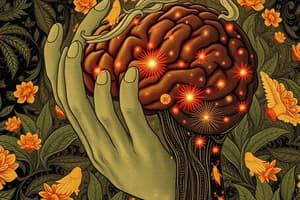Podcast
Questions and Answers
What is memory?
What is memory?
Memory is the process of encoding, storing, and retrieving information.
Who was Marcel Proust?
Who was Marcel Proust?
Marcel Proust was a French writer obsessed with memories.
What is the title of Proust's multi-volume work?
What is the title of Proust's multi-volume work?
Remembrance of Things Past
Proust's book describes dunking a madeleine cake in tea, which evokes a cascade of feelings and images from his _____ past.
Proust's book describes dunking a madeleine cake in tea, which evokes a cascade of feelings and images from his _____ past.
What are the three kinds of memory?
What are the three kinds of memory?
What is episodic memory?
What is episodic memory?
Give examples of episodic memory.
Give examples of episodic memory.
What are flashbulb memories?
What are flashbulb memories?
Provide an example of a flashbulb memory.
Provide an example of a flashbulb memory.
Why do certain memories become etched in our minds?
Why do certain memories become etched in our minds?
What is semantic memory?
What is semantic memory?
What does semantic mean?
What does semantic mean?
Episodic and semantic memories are both examples of ______ _________.
Episodic and semantic memories are both examples of ______ _________.
What can explicit memory refer to?
What can explicit memory refer to?
Flashcards are hidden until you start studying
Study Notes
Memory Definition and Processes
- Memory encompasses encoding, storing, and retrieving information.
- Types of memory include factual data, general knowledge, personal experiences, and learned skills.
Marcel Proust and Memory
- Marcel Proust was a French writer known for exploring the intricacies of memory.
- His work "Remembrance of Things Past" vividly details emotions and memories tied to past events and experiences.
Proust's Literary Exploration
- Proust describes a poignant moment involving a madeleine cake and tea that evokes memories of his childhood home.
- The sensory experience of taste can trigger vivid recollections and emotions tied to specific places and moments.
Types of Memory
- Memory can be classified into three categories:
- Episodic memory: Relates to personal past experiences.
- Semantic memory: Deals with general knowledge and facts.
- Implicit memory: Skills and tasks performed without conscious awareness.
Episodic Memory Explained
- Episodic memory pertains to memories of specific events experienced personally.
- Examples include clear recollections of recent meals or past quizzes.
Flashbulb Memories
- Flashbulb memories are vivid, detailed memories of significant events that leave a long-lasting impact.
- Examples include vivid recollections of strong emotional experiences such as first love.
Factors Influencing Strong Memories
- Certain memories are etched in our minds due to their emotional significance and distinctness.
- Flashbulb memories tend to arise from powerful emotions and frequent recollection.
Semantic Memory Insights
- Semantic memory encompasses general knowledge, language, facts, and concepts about the world.
- It includes what we consciously know and can articulate.
Explicit Memory Characteristics
- Explicit memory includes episodic and semantic memories that can be intentionally recalled.
- This type of memory is consciously recognized and articulated, encompassing personal and factual information.
Studying That Suits You
Use AI to generate personalized quizzes and flashcards to suit your learning preferences.




